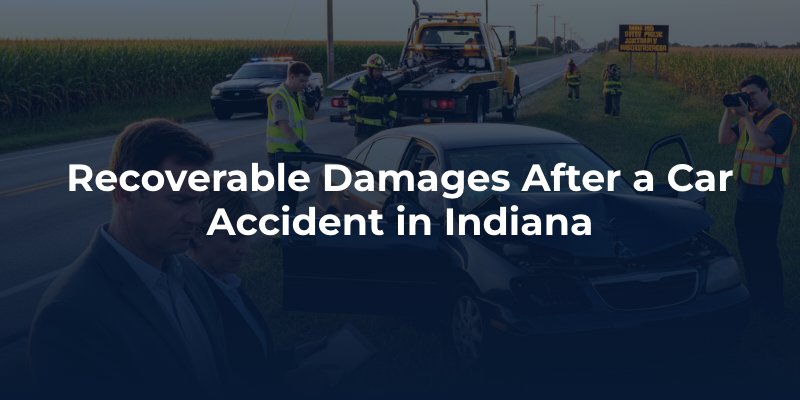After being injured in a car accident caused by someone else, understanding your recoverable damages is essential. If you want to ensure you receive the compensation you deserve, an Indianapolis car accident lawyer can help guide you through the process and protect your rights. From medical expenses to lost wages and emotional distress, knowing what damages you can claim is key to moving forward confidently. Contact us today to schedule a free consultation.

Past Medical Expenses
After an accident, your past medical expenses form one of the biggest categories of damages. These are bills for things like ER visits, hospital stays, imaging, surgery, prescriptions, and various forms of therapy.
Your Case Will Get
The Attention It Deserves

Future Medical and Life Care Expenses
Your recovery doesn’t always end once you leave the hospital; some injuries require ongoing or even lifelong treatment. This can include follow-up surgeries, pain injections, continued physical therapy, medical devices, new prescriptions, or making modifications to your home or car to accommodate new limitations.
Lost Wages and Loss of Earning Capacity
Serious injuries can pull you out of work either for a little bit of time or on a longer-term basis, sometimes even permanently. Any payment you miss out on because of the accident should be recoverable in your claim. Additionally, if you’re unable to earn the same amount of money in the future, you should be able to get compensated for that as well.


Property Damage
The repairs of your new vehicle or the cost of getting another car if yours was totaled can be included in your claim as well. It’s also important to include expenses for towing, storage, and anything related to the damage. Rental car costs and anything you had inside the vehicle that was damaged are something else to consider when you’re filing a claim after a car accident.

Out-of-Pocket Costs
Costs can add up quickly after an accident in ways that aren’t always obvious. Out-of-pocket expenses might include medical co-pays, travel for doctor visits, and payment for extra help around the house or childcare if you can’t keep up. Even buying over-the-counter medication and supplies, like bandages or braces, can get expensive. Keeping a detailed record and saving all receipts is important, as these are valid parts of your claim.
Pain and Suffering
Pain and suffering looks at how physical pain will affect your life going forward. These amounts can be hard to put into dollar amounts, but can make up a big part of your claim.
Emotional Distress and Mental Anguish
Car accidents don’t only harm the body; they often leave people with psychological injuries as well. This could be anxiety, depression, trouble sleeping, post-traumatic stress disorder (PTSD), or other changes in your mood. Counseling or therapy records and notes about how mental health affects your everyday life can be a big help in proving you are entitled to these damages.
Loss of Enjoyment of Life/Loss of Normal Activities
Part of compensation can come from losing out on the joys and pleasures of everyday life. Maybe you can’t play sports, go hiking, run around with your kids, or take part in your favorite hobbies anymore. While this is again hard to put a dollar value on, you can collect monetary compensation for these losses.
Disfigurement
If you suffer serious physical changes from the accident, like scars, burns, or lost limbs, you may be able to obtain monetary damages for the effect this can have on your life and your mental health.
Loss of Consortium (Spouse/Partner)
Major crashes not only impact the victim, but also family members, especially spouses when applicable. This loss can lead to a separate claim relating to reduced intimacy, companionship, or the inability to help out with children or daily responsibilities.
Punitive Damages (Rare but Possible)
While not common, the court may decide the defendant’s actions were so reckless or malicious that extra financial penalties, known as punitive damages, should be imposed.
IC 34-51-3-2 Necessity of evidence of facts Sec. 2. Before a person may recover punitive damages in any civil action, that person must establish, by clear and convincing evidence, all of the facts that are relied upon by that person to support the recovery of punitive damages.
These aren’t about compensating the injured person, but punishing wrongdoing and discouraging it in the future.
How Insurance Limits Affect Payouts
Every auto insurance policy has set limits, which are the maximum amounts that the insurance company will pay out for a claim. If your injuries, medical bills, or property damage go above those policy limits, the insurance company simply will not pay more, no matter how serious your case is. This means that if you have major losses in a serious crash, what you actually collect may be much less than what you deserve unless extra coverage or other liable parties are found.
What To Do if Losses Exceed Insurance Limits
If your total damages add up to more than the at-fault driver’s insurance will cover, you still have options under the law. One of the most common solutions is to file a personal injury lawsuit directly against the responsible party or any other entity that shares legal fault. By bringing a legal claim, you can try to recover the unpaid portion of your losses from the person’s assets. This can be a great option as long as they have assets.
Working with an Indiana personal injury lawyer is especially important in these cases to help identify all potential sources of recovery. If you have any questions about how much or what types of damages you could be entitled to, our team is here to help. We’ve been assisting accident victims for decades and will do everything we can to make sure you get the monetary compensation you deserve so you can focus on your recovery. Contact us today to schedule a free case consultation and learn what steps you need to take to move your case forward.






